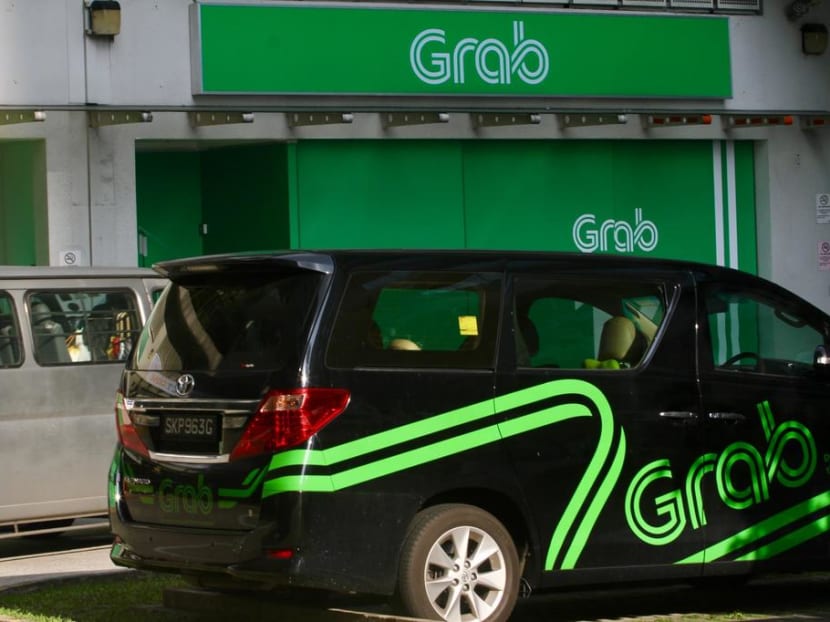Fallen from grace, Grab could learn ‘the hard way’ if it does not change its ways: Report
SINGAPORE — The fall from grace of “digital darling" Grab serves as a cautionary tale for digital disruptors, after its Uber takeover left riders and drivers up in arms over price hikes and lower incentives.

GrabCar offices at Midview City in Sin Ming. Grab’s high-profile acquisition of Uber’s South-east Asia business in March sent lawmakers and antitrust watchdogs scrambling to assess the deal’s impact on their markets.
SINGAPORE — The fall from grace of “digital darling" Grab serves as a cautionary tale for digital disruptors, after its Uber takeover left riders and drivers up in arms over price hikes and lower incentives.
Among other things, the firm’s rapid descent in the minds of riders and drivers points to the pitfalls of “weak” customer experience, and it could learn “the hard way” if it does not change its ways, said a report by Nasdaq-listed market research firm Forrester which was released on Thursday (Oct 4).
“The stunning pace with which Grab fell from its unquestioned position as a local digital hero should remind all e-business leaders that their customers are in charge," it said.
Grab’s high-profile acquisition of Uber’s South-east Asia business in March sent lawmakers and antitrust watchdogs scrambling to assess the deal’s impact on their markets.
In Singapore, users and drivers criticised the Singapore-based firm after it withdrew its promotional codes for riders and reduced drivers’ incentives.
Late last month, the Competition and Consumer Commission of Singapore (CCCS) imposed more than S$13 million in financial penalties on Grab and Uber, ruling that the deal was “anti-competitive”.
The competition watchdog also spelt out remedies, including dismantling Grab's exclusivity arrangements with taxi fleets and maintaining Grab's pricing algorithms and drivers' commission rates before the deal.
FROM ‘SCRAPPY’ START-UP TO MARKET LEADER
Pointing to “miscues” in the months since the deal was struck, the report said the “timing of the net price changes and Grab’s faulty messaging started to shift the perception of the firm from that of a scrappy local start-up focused on customers to a dominant market leader focused on the bottomline”.
After the deal, Grab increased its fares, after deducting rider promotions, by 10 to 15 per cent, the CCCS found. The firm, however, maintained that it has not raised fares and its average fare per ride has dipped 3.4 per cent since the acquisition.
The analysts behind the Forrester report interviewed 20 Grab drivers, and found that changes to Grab’s driver incentives after the deal, and unfair penalties and flaws in Grab’s mobile application, were among the common gripes.
The app — including its location-based services — vexed riders, too. The app declared a car’s arrival just seconds after it told them the vehicle was “many minutes away”, said the analysts, who also interviewed 20 commuters.
On the other end, drivers lamented the app’s inaccurate route estimation to the nearest job, which led to frequent cancellations and dented their ability to earn an acceptable income.
The report said Uber’s retreat afforded Grab “free rein to cement its position as the overwhelming market leader, riding the goodwill of a nation viewing it with pride as a victorious… digital hero — a local David that conquered the global Goliath”.
“However, the same lightning-quick change and lack of market barriers that allow digital innovators to topple established leaders can usher them out just as quickly,” it added.
Asked for his firm’s response to the report, Grab Singapore head Lim Kell Jay acknowledged that there is “a lot more” the company can do, and it is making every effort to improve its services and customer experience.
“We will work harder to rebuild our relationship with users in South-east Asia,” he said.
CUSTOMER EXPERIENCE: THE MAKE-OR-BREAK FACTOR
In recent years, Grab has diversified its business aggressively into electronic payments with GrabPay, and food delivery through the GrabFood platform.
But the Forrester report warned that the firm’s success will be torpedoed “if it doesn’t get its core customer-experience service right”.
The report added: “Customer trust is precarious and earned daily. Organisations earn it or burn it.”
Nevertheless, it acknowledged that firms must at times deliver unpleasant messages, such as changes to the frequency of promotions. Even so, they can control the timing and manner in which such messages are communicated.
For instance, Grab stoked complaints unnecessarily by allowing a price change to set in right after its deal with Uber, when “temporarily reversing those changes would have earned customers’ goodwill”.
The report concluded that mergers and acquisitions — among other things — can be useful short-term competitive tools, but would not last if the strategy of firms is not built on a model that delivers strong customer experience.
“Any strategic foundation that ignores this central mandate will eventually collapse,” the report said.
“If Grab doesn’t adjust course and execute (this), it will learn the power of customer obsession and customer experience the hard way.”
Sign up for TODAY's WhatsApp service. Click here:











